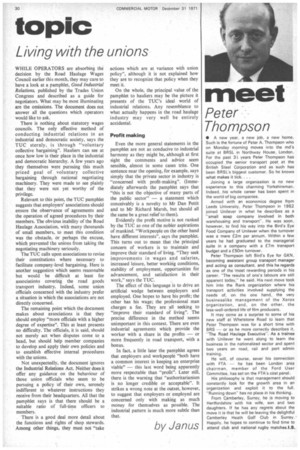topic
Page 32

If you've noticed an error in this article please click here to report it so we can fix it.
Living with the unions
WHILE OPERATORS are absorbing the decision by the Road Haulage Wages Council earlier this month, they may care to have a look at a pamphlet. Good Industrial Relations, published by the Trades Union Congress and described as a guide for negotiators. What may be most illuminating are the omissions. The document does not answer all the questions which operators would like to ask.
There is nothing about statutory wages councils. The only effective method of conducting industrial relations in an industrial and democratic society, says the TUC sternly, is through "voluntary collective bargaining". Hauliers can see at once how low is their place in the industrial and democratic hierarchy. A few years ago they themselves were pursuing this much prized goal of voluntary collective bargaining through national negotiating machinery. They were made to see plainly that they were not yet worthy of the privilege.
Relevant to this point, the TUC pamphlet suggests that employers' associations should ensure the observance of agreements and the operation of agreed procedures by their members. The obvious inability of the Road Haulage Association, with many thousands of small members, to meet this condition was the obstacle, or perhaps the excuse, which prevented the unions from taking the negotiating machinery seriously.
The TUC calls upon associations to revise their constitutions where necessary to facilitate company-level bargaining. Here is another suggestion which seems reasonable but would be difficult at least for associations covering the road goods transport industry. Indeed, some union officials concerned with the industry prefer a situation in which the associations are not directly concerned.
The remaining point which the document makes about associations is that they should employ "more officials with a higher degree of expertise". This at least presents no difficulty. The officials, it is said, should not merely act when disputes come to a head, but should help member companies to develop and apply their own policies and to establish effective internal procedures with the unions.
Not unexpectedly, the document ignores the Industrial Relations Act. Neither does it offer any guidance on the behaviour of those union officials who seem to be pursuing a policy of their own, serenely indifferent to whatever instructions they receive from their headquarters. All that the pamphlet says is that there should be a suitable ratio of full-time officers to members.
There is a good deal more detail about the functions and rights of shop stewards. Among other things, they must not "take actions which are at variance with union policy", although it is not explained how they are to recognize that policy when they meet it.
On the whole, the principal value of the pamphlet to hauliers may be the picture it presents of the TUC's ideal world of industrial relations. Any resemblance to what actually happens in the road haulage industry may very well be entirely accidental.
Profit making Even the more general statements in the pamphlet are not as conducive to industrial harmony as they might be, although at first sight the comments and advice seem sensible, almost in some cases trite. One sentence near the opening, for example, says simply that the private sector in industry is "concerned with profit-making". (Immediately afterwards the pamphlet says that "this is not the objective of many parts of the public sector" — a statement which conceivably is a novelty to Mr Dan Pettit and to Mr Richard Marsh, but should all the same be a great relief to them).
Evidently the profit motive is not ranked by the TUC as one of the nobler aspirations of mankind. "Workpeople on the other hand have different interests", says the pamphlet. This turns out to mean that the principal concern of workers is to maintain and improve their standard of living. "They seek improvements in wages and salaries, increased leisure, better working conditions, stability of employment, opportunities for advancement, and satisfaction in their work," says the TUC.
The effect of this language is to drive an artificial wedge between employers and employed. One hopes to have his profit; the other has his wage; the professional man charges a fee. They are all seeking to "improve their standard of living". The precise difference in the method seems unimportant in this context. There are even industrial agreements which provide the worker with a share in the profits — or more frequently in road transport, with a bonus.
In fact, a little later the pamphlet agrees that employers and workpeople "both have a common interest in keeping an enterprise viable" — this last word being apparently more respectable than "profit". Later still, there is the warning that "authoritarianism is no longer credible or acceptable". It strikes a wrong note at the outset, however, to suggest that employers or employed are concerned only with making as much money for themselves as possible. The industrial pattern is much more subtle than that.
by Janus












































































